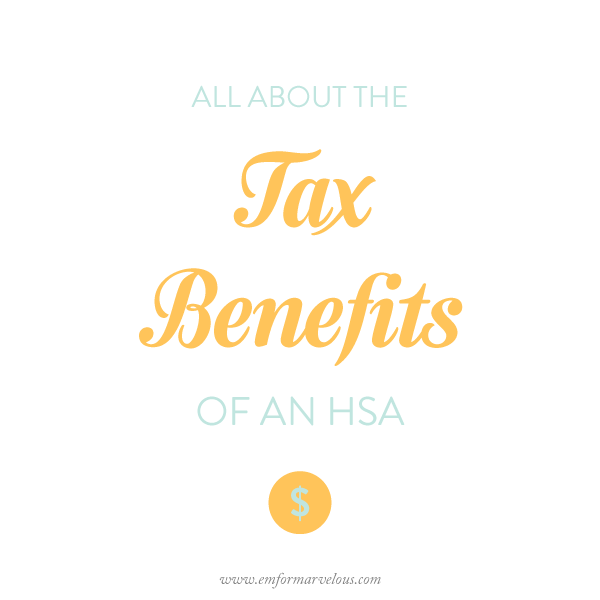Marvelous Money: The Tax Benefits of an HSA
Today’s Marvelous Money topic is narrow in scope, but potentially huge in impact! It’s not something that was on my radar until John introduced the idea, and so I figured it might be the same for some of you. Basically, a Health Savings Account is the most “tax-preferenced” savings vehicle in the U.S. right now, and it’s something you should definitely consider taking advantage of! Let’s chat about why.

Of course, before you can take advantage of an HSA as a savings vehicle, you have to make sure it’s the right fit for you for its primary purpose: as a form of health insurance! That’s something only you can determine, but if you’re of average health, it’s worth considering.
An HSA is used in tandem with a high-deductible health insurance plan. A high-deductible plan means you pay a lower premium — the monthly cost of your insurance — but you are responsible for paying for expenses up to your deductible (currently defined as at least $2,700 for a family) and potentially up to your out-of-pocket maximum (at most, currently, $13,300 for a family). An HSA comes alongside your insurance plan to help you save for these expenses.
There are four main financial benefits of a Health Savings Account:
1. Your contributions are tax-free. Contributions to your HSA are 100% deductible (up to a max of $6,900 for a family in 2018). Because income is taxed after you make HSA contributions, you will be taxed as though you make less money — for example, if you make $50,000 per year and put $5,000 into your HSA, you will be taxed as though you make $45,000, lowering your tax burden.
HSA contributions are actually considered SUPER tax-free, because they are both income tax-free AND payroll tax-free! This all helps to reduce the amount you pay in taxes.
2. Your withdrawals are tax-free. Withdrawals to pay qualified medical expenses, including dental and vision, are never taxed.
3. Your earnings are tax-free. An HSA is an investment account (with the freedom to access mutual funds, stocks, or other vehicles of your choice) with the expectation that the money you invest will grow over time to help you pay medical expenses in the future. If and when it does, and you use it to pay qualified medical expenses, you won’t pay any taxes on it.
4. The money is yours. Unlike a flexible spending account (FSA), unused money in your HSA isn’t forfeited at the end of the year. It rolls over and continues to grow tax-free year after year.
Basically, an HSA combines ALL of the best tax advantages possible, while giving you the opportunity to save for future expenses you will almost certainly incur — since the average couple retiring at age 65 will spend $280k in medical expenses over the course of their retirement.
And, if at age 65 your HSA investments are super-successful and you have more money socked away in your account than you could ever need for medical expenses? You still have the option of withdrawing the money for any purpose and only paying regular income taxes (as you would with a traditional IRA). If you do so before 65, you’ll pay a hefty penalty.
As you may have guessed, an HSA and high-deductible plan is the health insurance option we’ve chosen for our family! Thanks to John’s employer, we are lucky to have a low out-of-pocket maximum, which makes an HSA pretty much a no-brainer for us. When we first opened the account, we started by contributing the out-of-pocket maximum each year (for us, lower than the IRS limit). Now, we’re able to contribute up to the limit — it’s our second savings priority after making sure we get our 401k employer matches. (Our mortgage savings account is third.) As with all investment accounts, the more we can put in now, the more time it has to grow, and the more we can make our money work for us!
P.S. If your health insurance is through your company, check to see if your employer will contribute to your account – many do!
Friends, I’d love to hear: do you have an HSA? Have you been able to take advantage of it as a savings vehicle?
More Marvelous Money:
The cost of our first year with a baby
Managing money together
26 ways to save money
Our car fund



















This may be a silly question, but how does one start an HSA? Is it an account you can set up with a bank? Is it only available if your employer offers it as part of its insurance/benefits package? I had only heard of the FSA before, and hadn’t paid too much attention to that, since it felt like as young, healthy people we’d be likely to lose money at the end of the year.
Not a silly question! Never a silly question :) HSAs are generally available both through employer-provided insurance and private insurance (for example, Blue Cross Blue Shield offers an HSA option in our state of NC). Either way, if it’s an employer-provided plan, they will choose the institution for the savings account – it could be through a company like Fidelity, or HealthEquity seems to be a big one. If it’s a private plan, I’m not sure whether you can open it anywhere or if they would have a mandatory provider. The investment options will vary depending on the host! Hope that helps!
I’m wondering the same thing :) Can you start your own HSA (with a bank?) even if your employer/insurance holder doesn’t provide?
An HSA can only be used in conjunction with a high-deductible plan, and you can’t use any other type of health insurance while you have it. If your employer doesn’t provide, you’d have to look for a private option!
It sounds like my husband and I have a similar health insurance plan to y’all (also offered through my employer). My employer deposits some money in it each year (to cover the cost of meeting my deductible), but I admit that I am not currently adding any additional funds to it at this time.
However, I know that I should be taking advantage of it more – this post is a good kick in the seat of my pants that I should look into it!
Just realized this was super vague – by “it”, I mean my HSA!
I used my company’s HSA plan back in 2015/16 when I was pregnant. It worked out really well knowing what my max cost would be. At that time, the deductible was reasonable and the monthly payments were almost identical to the PPO plan, so I felt very comfortable signing up for it.
Now, I’m too nervous to sign up for the HSA plan!! While I am healthy I accept that anything crazy can happen at any time, eeep! The ridiculously high deductible is not worth the extra $25 I shell out monthly for the PPO plan. It is what it is, I guess, and I know my employer tries the best they can with negotiating costs.
So, that’s wonderful that John’s company provides such a great plan! The year my company’s deductible becomes less scary will be the year I sign up for it again!
This is so helpful! We’ve been examining our various forms of insurance with the consideration of increasing our deductible in exchange for a lower premium so we can save the excess funds. This truly seems like a no-brainer!
I love this topic! I have had an HSA for years, and I love it. I have contributed some additional funds to it outside of what my employer contributed in the past because I use it as a vehicle to pay for current medical expenses and help myself pay for future ones, but now I am contributing to it completely on my own because I am no longer working for that employer. I have not considered using it as a savings tool for retirement though – thank you for mentioning it! I have had what one could call a “medical year” (HA!), so the funding in it is quite low and I’m just trying to stay afloat. Hopefully next year will involve much more saving and much less spending. :)
We have an HSA, but its worth noting that many employers only let a certain amount roll over each year, and that amount has to be used within a certain time period. It is a great resource for us, though — we are planning to have our HSA help offset the costs of having another baby, and possibly pay for childcare. :)
Hey friend! I think you’re talking about an FSA! With an HSA, the money is ALWAYS yours, and rolls over indefinitely. And it can only be used for healthcare costs, not childcare! We also have an FSA and DO use it for childcare – maybe I should write another post about those accounts! :)